He started in a band with John Mellencamp in small-town Indiana. One stayed, the other left.
- Oops!Something went wrong.Please try again later.
Fred Booker stepped onto the stage of the Beech Grove Moose lodge with his band, The Soul Express, for the group's first show since New Year's Eve and delivered a rollicking night of classic soul covers that kept a crowd of about 100 bopping.
Later that same night, John Mellencamp took the stage of the Encore Theater at the Wynn resort in Las Vegas, where the Rock & Roll Hall of Famer treated the audience to 20 of his original songs during the 28th show of a 77-performance tour.
Those performances, more than 1,800 miles apart, on the last Saturday night of March showcased two extremes: A rock star who's traveled the world playing originals and a weekend warrior plugging away with a cover band in local bars and clubs.
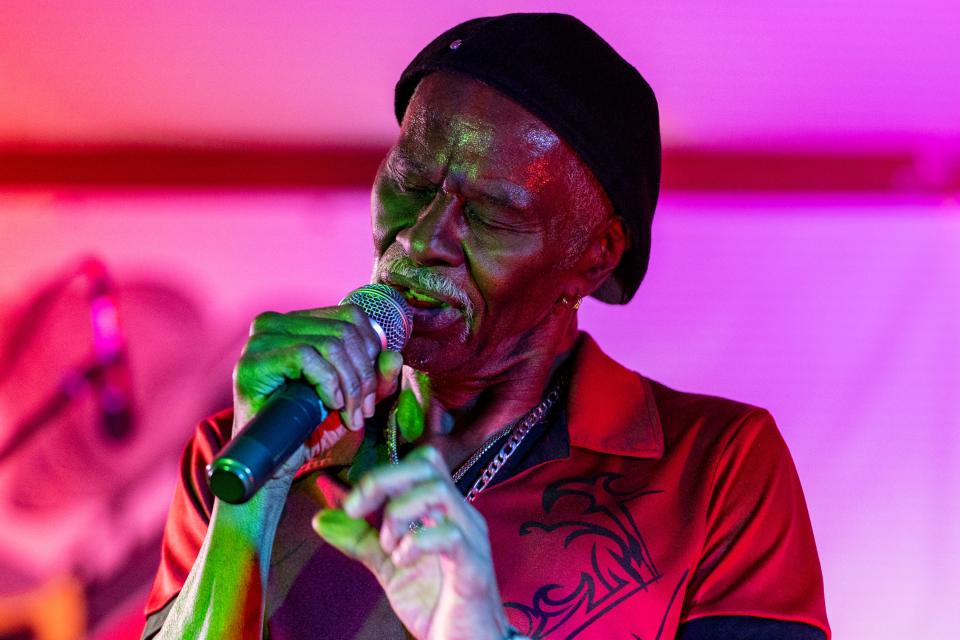
But this isn't a story about the types of music Mellencamp and Booker perform, or even where they were playing that particular night. It's about two men who started performing together as teenage bandmates and the distinct paths they've chosen to take on lifelong musical journeys.
The link between Mellencamp and Booker runs all the way back to Southern Indiana in the 1960s, when they were teenagers — one Black, the other white — sharing vocal duties at local dances, fraternities, roller rinks and racetracks as co-lead singers with the popular Seymour-based band called The Crape Soul. (The band also went by Crepe Soul, but a business card Booker still carries that lists him and Mellencamp as vocalists uses the "Crape" spelling.)
At the time, Booker, a lanky 17-year-old, was the band's established star. Mellencamp, just 14 and still active in track and football in school, was the new addition with a lot of ambition but little experience. After about 18 months, Mellencamp left the group and the two went their separate ways.
Now in their early 70s, both are grandfathers. Both are survivors of serious health scares. And both are still pursuing the muse that united them as teens. But now, Booker and Mellencamp perform for different reasons — and for different audiences.
Mellencamp said he'd prefer to just stay home and record music. As it is, he's already skipping rowdy crowds in big outdoor venues in favor of the controlled, intimate setting of theater shows.
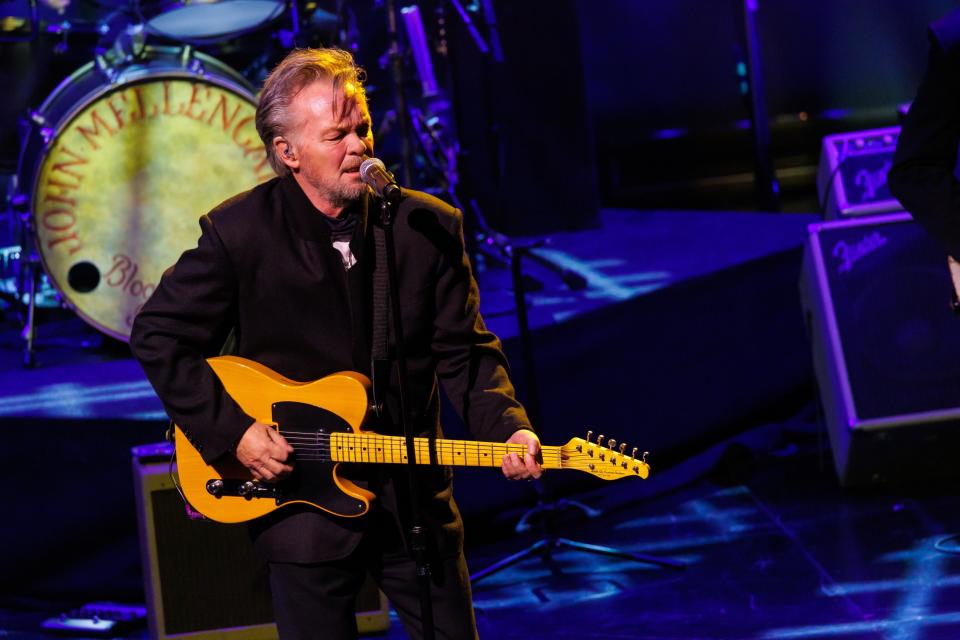
“If it was up to me, I wouldn’t go out (on tour)," he said during 60-minute interview. "But I support a lot of people, and they need to make a living."
Booker still loves the thrill of being on stage and moving people with his music, even if that's only a few dozen fans dancing at a local bar.
"I do it for the love of music," he said. "I've had a couple of issues with my health, but by the grace of God I've been able to come back and with all the good friends that I've got, especially in the band, and my wife, my kids, you know, I've been able to continue doing something that I really love."
Road to fame started in cover band
Mellencamp left his hometown years ago to chase fame in the music business. By his early 20s, he had a record deal, performing under the names of Johnny Cougar (the creation of an agent) and John Cougar Mellencamp before a series of hit records and popular MTV videos in the early 1980s earned him the right to perform and publish under his given name.
He has sold more than 60 million records worldwide, performed with Bruce Springsteen, Bob Dylan, Willie Nelson and scores of other stars. He was inducted into the Rock & Roll Hall of Fame in 2008 and the Songwriters Hall of Fame in 2018. In 1985, he co-founded Farm Aid with Nelson and Neil Young.
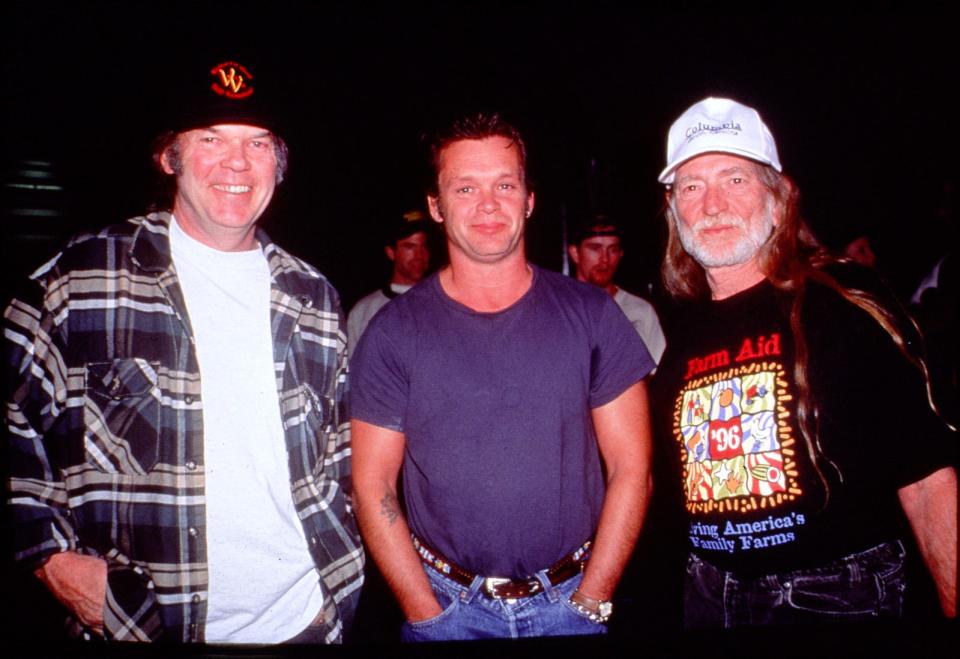
Booker stayed closer to home, working for many years at an auto parts manufacturing plant in Columbus. Now retired, he has survived two bouts of colon cancer. Through the years, he has continued to perform in clubs and bars, playing in several different bands before joining the Soul Express band in 2016.
But in the mid-1960s, when he was just 14 years old, Mellencamp was still learning how to perform. He had sung along with records with a group of young guys and remembers being “in and out of bands all the time.” Then, he was asked to join Crape Soul, an interracial band of Seymour teenagers built around Booker’s vocal talent and showmanship.
“Fred was the entertainer,” said Michael Henderson, a keyboard player who was in Crape Soul and now plays with Soul Express. “He put on a hell of a show.”
Booker remembers that the band was popular because it played all kinds of popular music. He would cover the Motown and rhythm and blues tunes, and Mellencamp would sing songs by white artists like Mitch Ryder and John Sebastian. Mellencamp even sang the pop hit “I’m Your Puppet.”
Mellencamp in Indiana: Back on tour after four years, brings it home with grit and energy
Duane Zimmerman, Crape Soul’s drummer, said the showmanship of the two lead singers was the band’s trademark.
“We were a show band,” Zimmerman said. “I mean Fred and John would get out there and dance and do the splits.”
Zimmerman said the band was also known for its snappy outfits, including Nehru collars and tapered pants, that would change for each of its four sets a night.
“We had a set of clothes for every set we played,” said Zimmerman. “We would get so sweaty that we would have to change. We had about as much wardrobe to haul around as we did instruments.”
Mellencamp said he learned a lot performing alongside Booker.
“Being a young kid, I watched the way he handled himself on stage and the way he would project,” said Mellencamp. “We were both the lead singers. We would trade parts back and forth, and we’d harmonize … well, Fred called it harmonizing.”
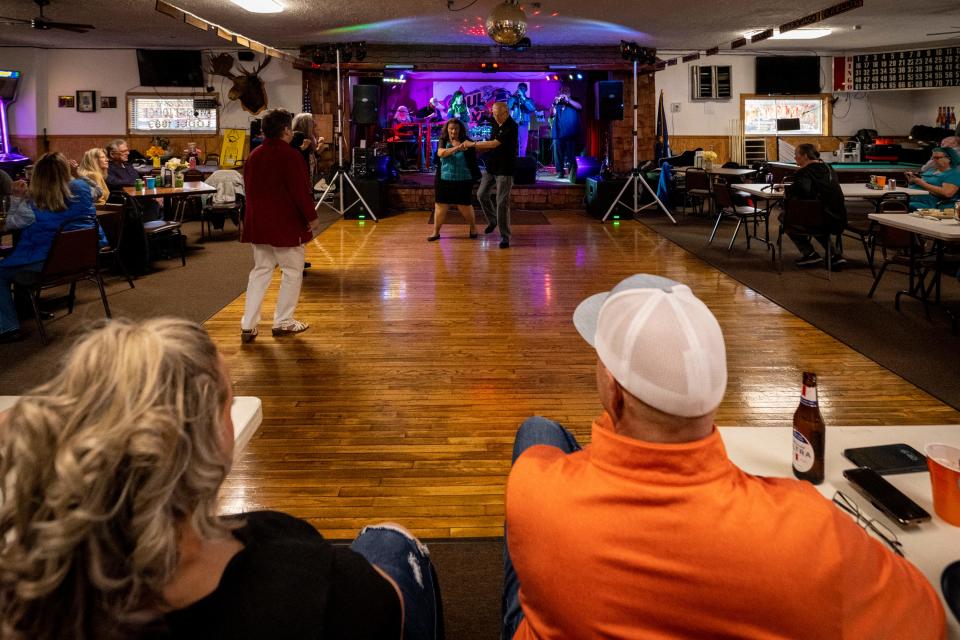
The band played at fraternity houses, battles of the bands, the Salem Speedway and the Rock-Sey roller rink Mellencamp’s uncle Joe owned just north of Seymour. Mellencamp also remembers playing in bars when he was only 14 years old.
A typical gig earned the band $500 to split among the group’s seven members.
“It’s not much by today’s standards, but when you’re 14 years old and you have 25 dollars in your pocket, and it’s 1966 … man, I was the best-dressed kid in my class,” said Mellencamp, recalling that gasoline then cost about 25 cents a gallon and cigarettes 18 cents a pack.
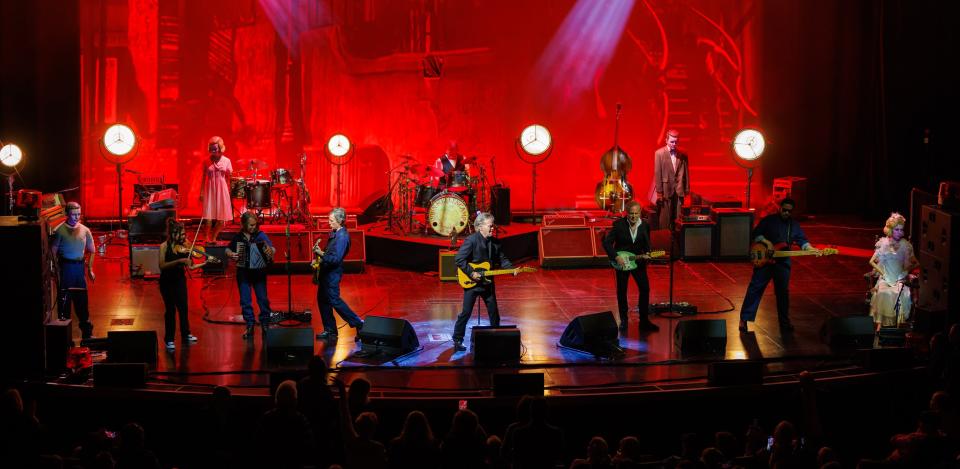
Crape Soul part of a rich musical heritage
Booker believes Crape Soul was the best band in its region back in the mid-1960s. It was one of many in Seymour in those days.
“It’s always been the number one band in Seymour,” Booker said. “We did whatever was hot back then, or whatever we thought was hot. Our gimmick, and what really made the band work, was that we were doing stuff by Black and white artists while other bands were just playing rock and roll. We covered it all, and that made our band stand out more than any band around here.”
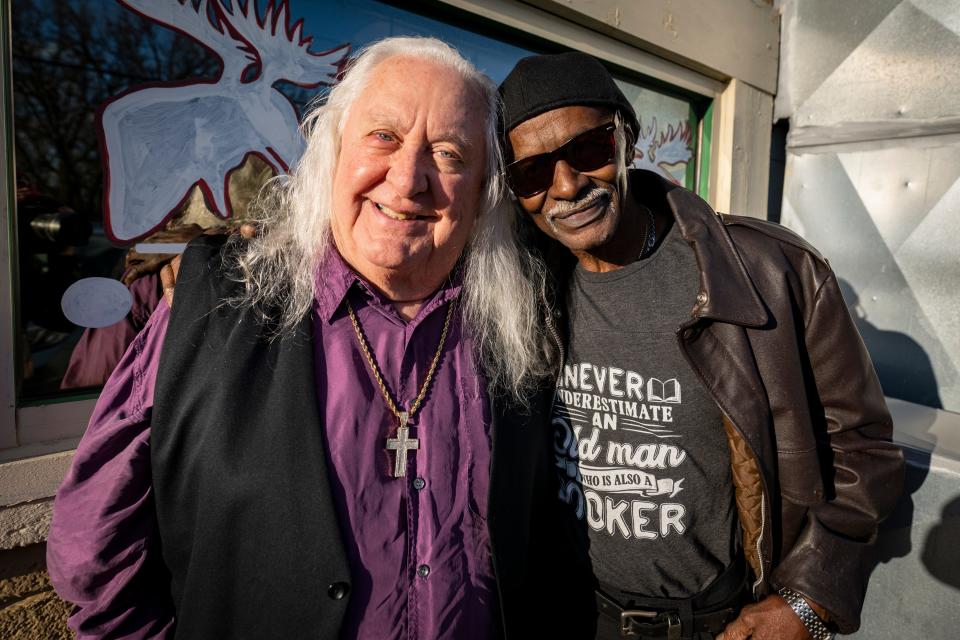
Henderson remembers a very active music scene in Seymour.
“There was a lot of incredible talent in Seymour for such a small town,” said Henderson, who later was a touring musician for 25 years before settling in Columbus and rejoining a band with Booker.
In addition to the guys in Crape Soul, Seymour produced talent such as Larry Crane, a guitarist who played with Mellencamp’s band for several years, and Zimmerman’s cousin, George Green, who collaborated with Mellencamp on several hit songs, including “Minutes to Memories,” “Hurts So Good,” “Crumblin’ Down” and “Rain on the Scarecrow.”
Aspiring musicians could hear plenty of live music, too, at the teen club “The Last Exit” at the Presbyterian Church. Located in the church basement, the club would host concerts by popular regional acts such as The Real McCoys, the Rick Derringer-led band famous for “Hang on, Sloopy,” and Billy Joe Royal, known for the 1965 hit “Down in the Boondocks.”
Music accompanied by lessons on race
Seymour calls itself the “Crossroads of Southern Indiana,” or did back in the 1960s. Then a town of approximately 15,000, it sits just west of the intersection of Interstate 65 and U.S. 50. About an hour’s drive to Louisville to the south and Indianapolis to the north, the city also marks the point where the old Penn Central and Baltimore & Ohio railroad lines crossed.
In the mid-1960s, Booker’s family was one of only 28 Black families in town, and most lived close to each other in the city’s west end. There were only three Black students in Mellencamp’s high school graduating class in 1970.
So playing in a band with two Black teenagers — Booker and Dennis Blair, later Booker’s brother-in-law — taught Mellencamp some other lessons.
“The interesting thing about being in that band was I learned about race, real quick,” said Mellencamp. “There were a couple of times when we played some place, and they loved us on stage. But when we came off stage, it was like the white kids were able to stay inside the building, but Fred and everybody else had to go outside. So I just went outside with them.
“I learned a lot about how different being African American in America was, as opposed to being a white kid,” said Mellencamp, who once talked about this experience during a performance at the White House in 2010.
Booker doesn’t remember as much racial animus. But he does acknowledge that “when you’ve got this Black guy talking to this white girl, they (the girls’ boyfriends) are not too crazy about that.”
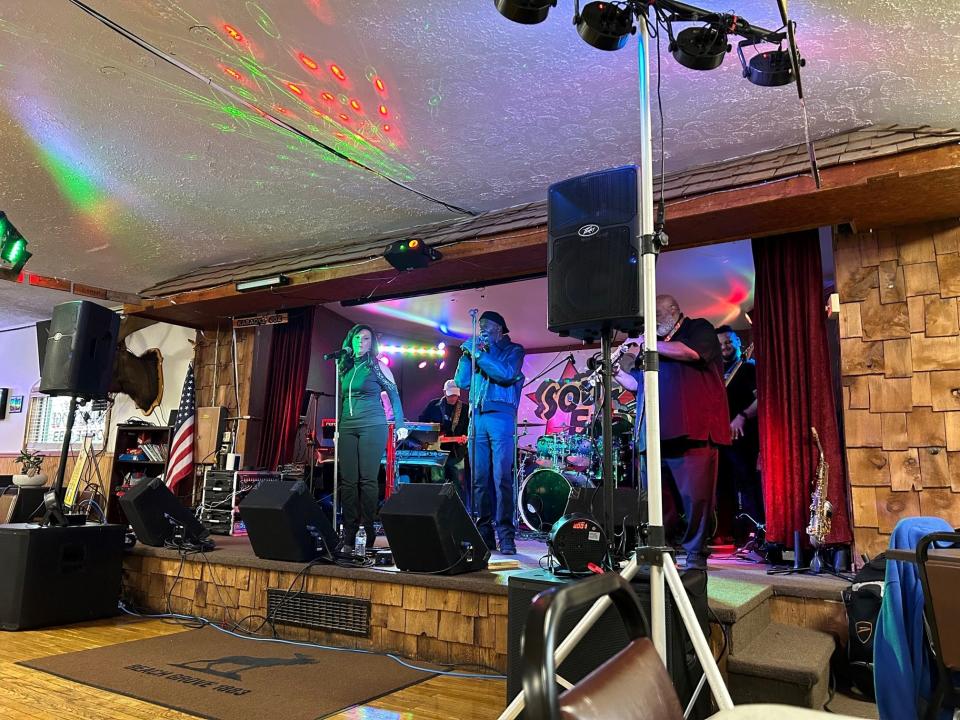
"Seymour was pretty mellow, but a lot of the places we played weren’t," Booker said before the Beech Grove show.
"They ran us out of town," Henderson interjected.
"We were probably one of the first integrated bands in Southern Indiana," Booker said. "It wasn’t really that easy, you know, all the race stuff going around. But when Crape Soul was on stage it was all harmony."
Mellencamp also remembered that the Booker family always treated him well when the band would occasionally practice at their home.
“My dad (Richard Mellencamp) and his dad (Benny Booker) went to high school together, and didn’t like each other. They got into three or four fistfights back then,” Mellencamp said. “So for them to have a Mellencamp kid in their house, and they treated me like I was one of their kids … it was a good experience.”
Booker stayed home, Mellencamp became Johnny Cougar
Crape Soul brought in a new singer after Mellencamp left to play solo gigs in restaurants and clubs. He later fronted a band with Crane and some Seymour friends in the early 1970s.
He returned to Seymour in the mid-1970s, with a new record contract, a new band called Tiger Force and the Cougar name to perform at the National Guard Armory in Seymour. He didn’t give another public performance in his hometown until last summer, when he played at a fund-raiser for the Southern Indiana Center for the Arts, an institution Mellencamp endowed and his son Speck now runs as executive director.
Booker continued to perform in Seymour and other Southern Indiana towns. In 2005, some of the original members of Crape Soul, including Zimmerman and Henderson, came together for what was intended to be a one-night reunion. Instead, they played together as Crape Soul for five years. And Booker still had the star power Henderson remembered from their earlier years together.
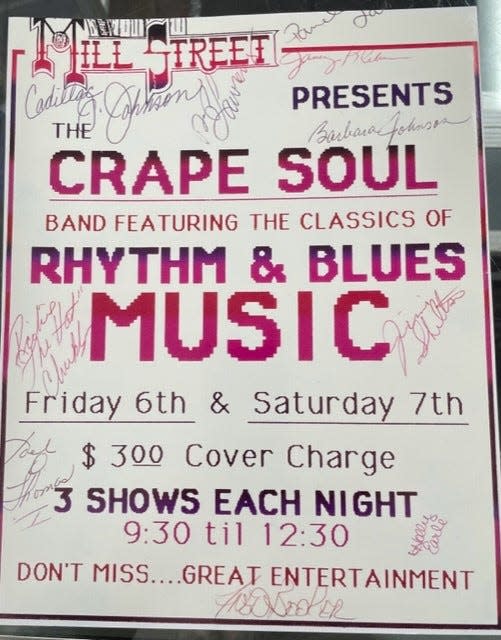
“His voice is to me the most impressive thing. He’s a crooner,” said Henderson. “He has an extremely good ear. He can hear and emulate the inflections of the singer he is covering.
“Now when we were kids, oh my God, Fred was the entertainer. I mean he would dance and do the splits and the girls would go wild,” said Henderson. “Of course now, he’s 72. He’s a little more subdued, but his voice still carries his performance.”
Reports: Mellencamp condemns antisemitism during Rock & Roll Hall of Fame speech
Soul Express “is off the chain,” in Booker’s words. “Everyone is the band is just off the chain,” he said. “The whole band is great.”
The current band plays gigs at places like the Columbus Moose lodge, the Garage Pub in Seymour. Scheduling can be difficult because some of the people in Soul Express play in more than one band, Henderson said. Vickie Thomas sings lead on some tunes and handles the bookings and logistics for the band. Booker said the band made $2,000 for playing a private party last year and usually needs to net $1,000 a night to cover costs.
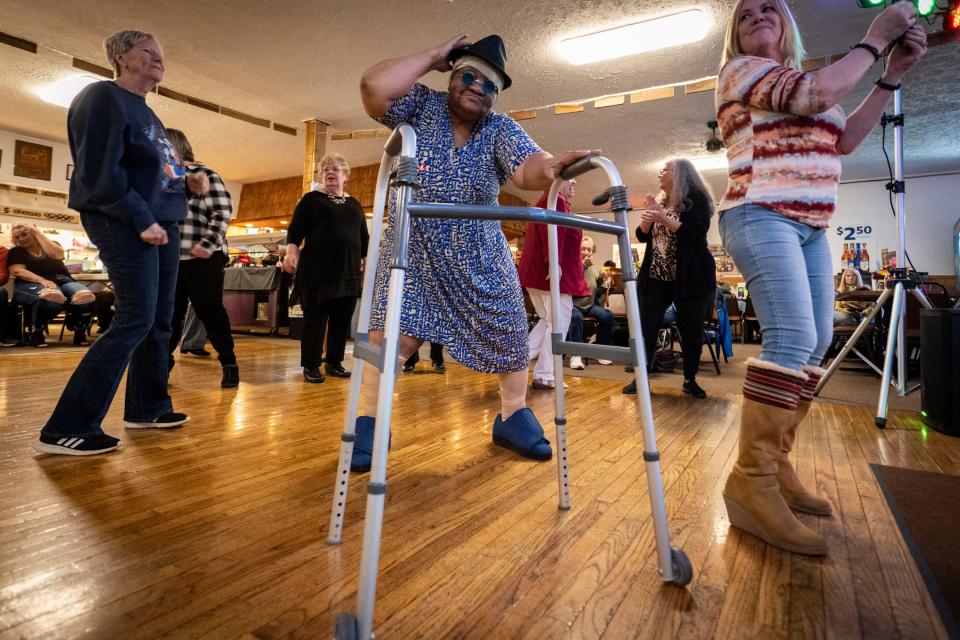
“We’re not doing it for the money," Booker said. "We’re doing it for the love of music.”
On the recent night in Beech Grove, Booker and the band performed some of the same songs Booker has been covering for more than 50 years: “Knock on Wood” by Eddie Floyd, Sam and Dave’s “When Something is Wrong with My Baby.”
“Some songs never die. People love them,” said Booker. “It does me so much good when people walk up to me, and they say, ‘Wow, man, when you did such and such song, it just took me back to my teen years.'”
Mellencamp prefers smaller venues
Mellencamp's current tour, his first post-COVID, continues until late June. He plays many of the songs that are his signature Heartland rock hits such as "Small Town," "Jack and Diane," "Pink Houses" and "Check It Out."
The tour will take him coast to coast, from New York to California, and he will play in some of music’s most famous venues, including multiple shows at the Beacon Theatre in New York City, the State Theatre in Minneapolis and the Ryman Auditorium in Nashville.
It’s a grueling schedule, one that Mellencamp takes on with some reluctance.
“If it was just up to me, I would just say, ‘OK, I’m just going to write songs and make records and not go on tour,’" said Mellencamp, who had a heart attack during a tour when he was 42. “They don’t pay me for going on stage. They pay me for leaving the house.”
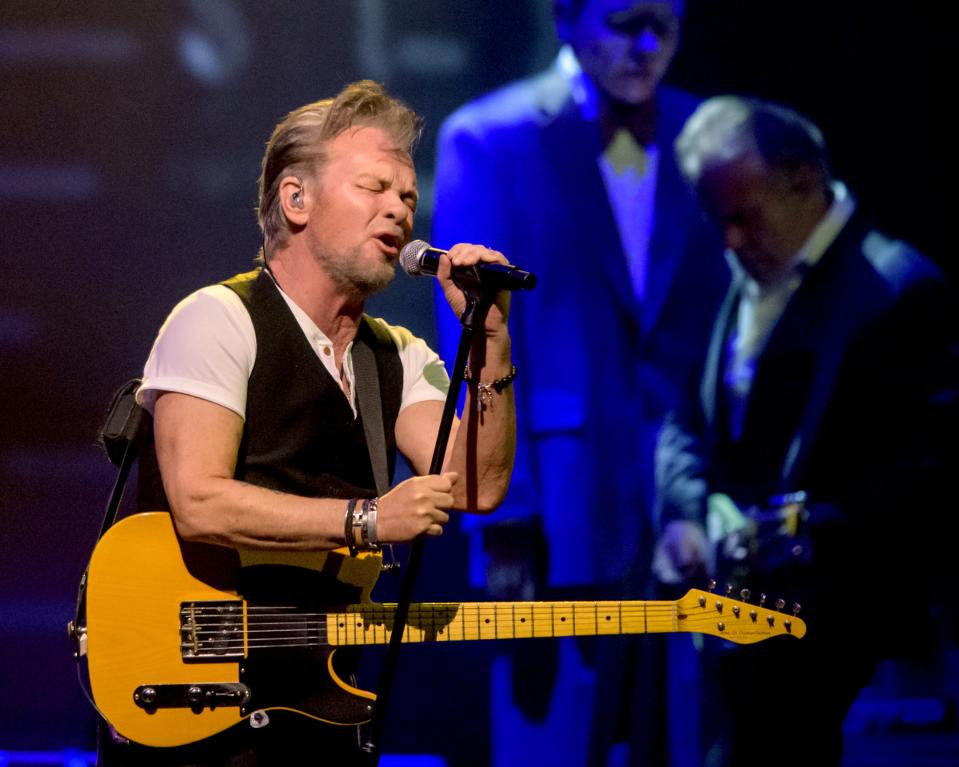
Most of the members of Mellencamp’s band have been playing with him for years. Mike Wanchic, a guitarist from Bloomington, has been in the band for almost 50 years. The most junior member of the core group has been with him for about 20 years, Mellencamp said.
In the past, Mellencamp performed in packed outdoor stadiums; the first Farm Aid concert in the University of Illinois football stadium drew more than 80,000 fans. He also played in sold-out indoor arenas, such as Madison Square Garden in New York and the old Market Square Arena in Indianapolis.
These days, he only plays smaller venues.
“I made a decision, because I would get too nervous, that I wouldn’t go into arenas anymore,” he said. “I just couldn’t do it. I would walk into those arenas and think I don’t want to do this. Because it just becomes crowd control. Everybody’s drunk and everybody wants to fight and have parties. I’m just not interested. It’s like playing a big bar.
“So about 15 years ago, I told my manager: ‘I’m a musician. I play music. I want my songs heard.’ So I’m only going into the nicest theaters, and my audience is older and they appreciate it.
“I don’t make as much money, and I’ve got to do repeats, but I enjoy the experience because the people are there to hear music,” Mellencamp said. “I can bring out a guitar and play a quiet song and not have a heckler or a bunch of noise. I don’t mean to sound like a martyr or anything, but for me to continue, that’s what I had to do. I took a huge pay cut, but I can continue. You’ve got to enjoy it. If you don’t enjoy it, you’re cheating the customer and yourself.”
Touring is one of the more reliable ways to make money since modern technology — the internet, file-sharing and streaming services — changed the music business dramatically. In the past, Mellencamp had three albums (“American Fool,” “Uh-huh” and “Scarecrow”) that each sold more than five million copies. Sales figures like that are rare these days. His 25th studio album, “Orpheus Descending,” is scheduled for release in June.
“The internet should have been treated the same way that they treated television and radio. They play your song and you get a royalty,” he said. “But when the internet came people thought like, ‘Oh, this is magic.’ So they let people start file trading, and they just stole all of our music. We all lost millions and millions of dollars.”
Booker, Mellencamp haven't talked for years
Booker and Mellencamp haven’t seen each other or talked for 40 years. Booker and his family appeared in a cameo role in a music video for Mellencamp’s “Human Wheels” album. And Booker, with other Seymour friends, appeared onscreen for 30 seconds singing a verse of “Small Town” for a 2008 documentary “Homeward Bound” about the rock star. Zimmerman and some of the old gang would love to see their old bandmate.
“Everyone in that band is still kicking, except Dennis Blair. I always thought it would be a good thing if we could get together,” Zimmerman said.
Booker doesn't think that is likely.
"John don't come around us anymore. I don’t know why. He should. We're all still supposed to be friends," Booker said. "He should come around more. We'd like to see him. I'd like to see him, just, you know, to shoot the stuff with him."
And if the rock star did show up at a Soul Express show?
"I'd say, 'You want to get on stage with us?'" Booker said. "Or 'let us get on stage with you. We’d love to open for you sometime.'"
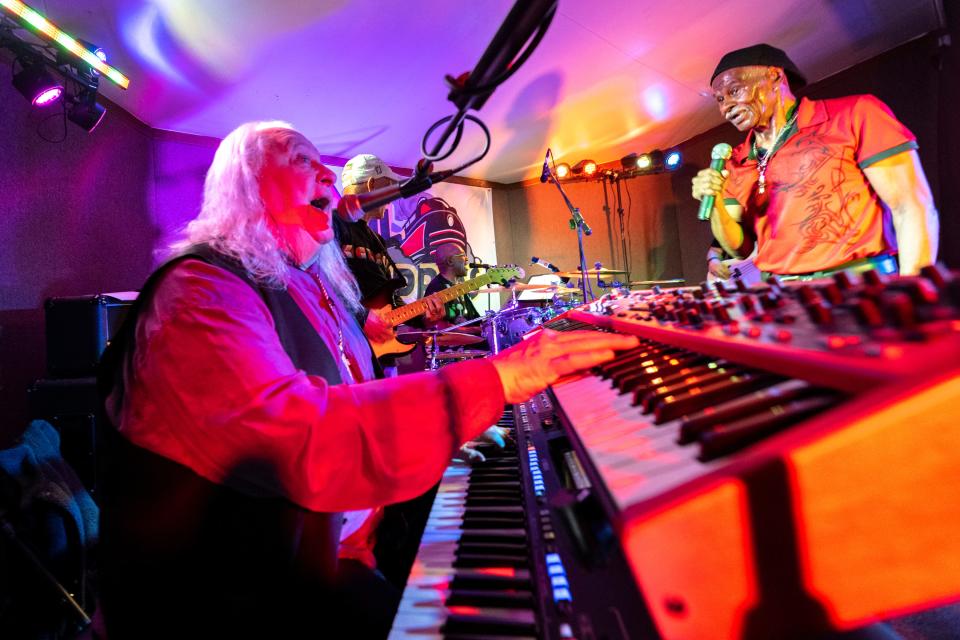
Booker is just pleased that he can still tell stories about playing alongside a Rock & Rock Hall of Famer.
“I’m just happy and glad I had a part in John’s musical history,” said Booker. “I’m very proud of that.”
Booker is just as proud to be a solid citizen in his hometown. Over the years, he’s played several benefit gigs to raise money for local causes. “I still love the people here. I love my town,” said Booker. “I’ve tried to give my all to this town.”
Mellencamp on Springsteen: John Mellencamp says Springsteen made him work harder: 'I’ve gotta compete with that'
Mellencamp, whose primary residence is near Bloomington, returns to Seymour occasionally to visit his 91-year-old father, his two sisters and son Speck. But he rarely appears in public in the small town he made famous.
One exception came in October 2019, when Mellencamp attended the ceremony to reveal a 35-by-50-foot mural of him painted by artist Pamela Bliss on the brick wall of the Old Guitar Music Store in downtown Seymour. His image and reputation loom large over his small town.
Meanwhile, Booker and his band are looking for more gigs in Seymour and small towns now that the band has found a new bass player and guitar player. The band played at the Columbus Moose lodge April 22, and has 10 bookings through the end of the year. Booker is looking forward to getting back on stage, even it’s a small one at a Moose lodge.
“I never went big. I never wanted to go big,” Booker said. “But if I can bring a smile to someone’s face, I’m as successful as John Mellencamp.”
Additional reporting by Tim Evans, investigations editor for IndyStar.
Author note: A Seymour High School graduate, Doug Richardson reported for and edited newspapers in Seymour and New Castle. From 1984-1992, he worked for the Associated Press in Indianapolis, where he was the wire service’s Statehouse correspondent.
This article originally appeared on Indianapolis Star: John Mellencamp, Fred Booker 50 years in: Playing for different reasons

